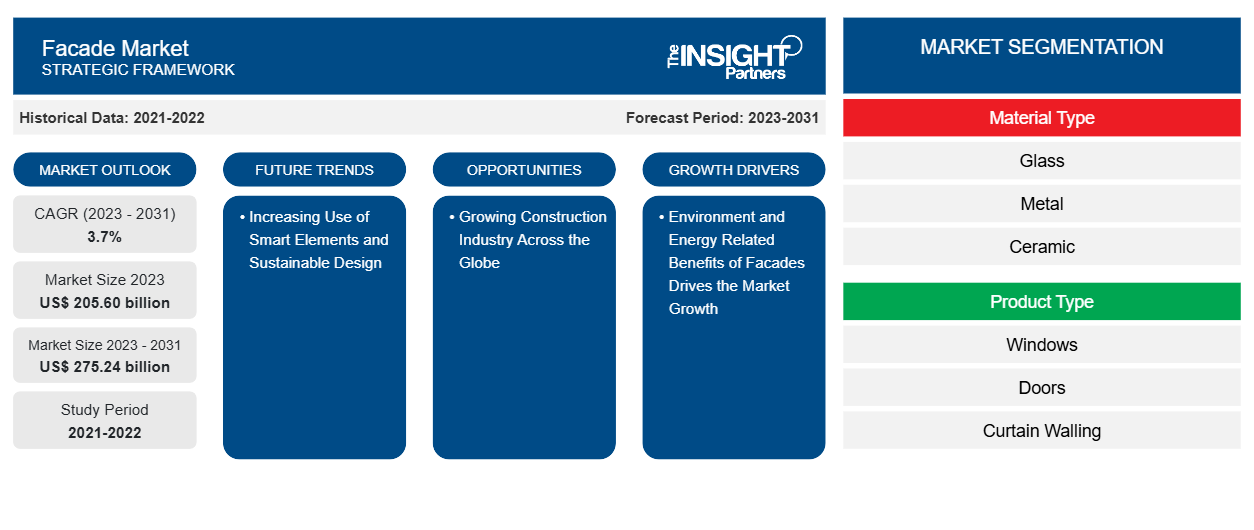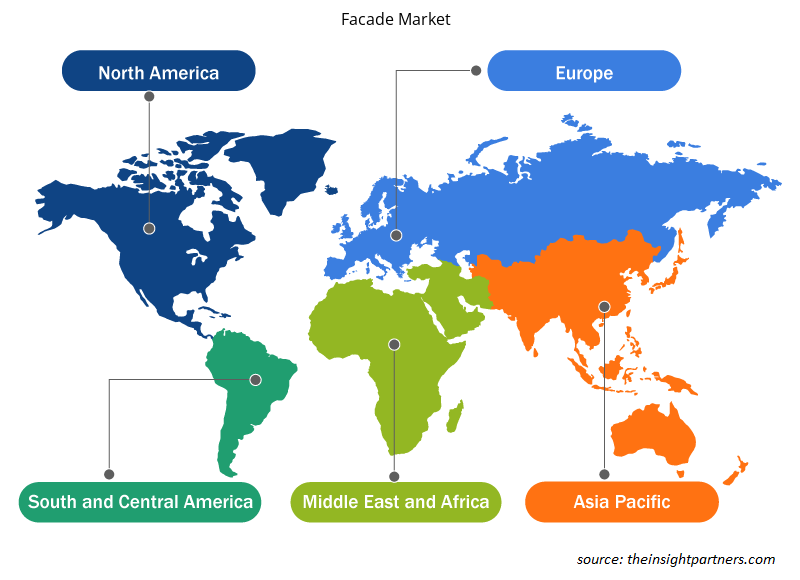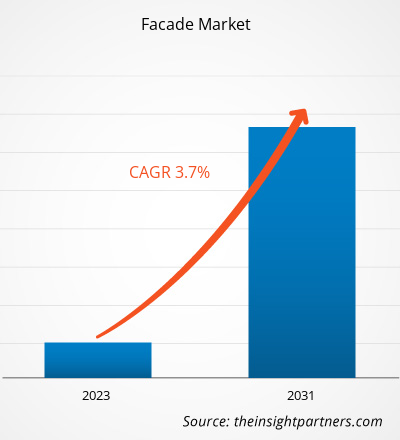The facade market is projected to reach US$ 275.24 billion by 2031 from US$ 205.60 billion in 2023. The market is expected to register a CAGR of 3.7% during 2023–2031. The growing construction industry across the globe is likely to remain key facade market trends.
Facade Market Analysis
Smart building design in the construction industry is closely linked to sustainability. Applying smart elements to upcoming facades includes selecting and testing different technologies to enhance the quality and abilities of a facade system. Also, advanced technologies are being incorporated to enhance the facades by adding value and function to buildings. A facade can be attributed as smart when it can adapt to environmental conditions and transform accordingly, subject to the components' adjustability and adaptability to different conditions, both inside and outside the building. Smart facades also include smart glazing to maximize sunlight while protecting against solar radiation, simultaneously controlling ventilation and heating when required.
Facade Market Overview
The growing construction industry supported by favorable government assistance and rising inclination toward constructing green buildings are impacting the infrastructural projects, driving the growth of the facade market. Also, penetration of advanced insulation material, Unplasticized Polyvinyl Chloride (UPVC), and double skin facades is higher than other materials as it improves the energy efficiency of a building. Moreover, with the advent of sophisticated technologies such as precast façade panels in the facade, the construction industry is projected to witness growth in the coming years.
Based on material, the global facade market is segmented into glass, metal, ceramic, wood and others. Metal segment is further divided into aluminum, copper, steel, and others. The metal segment held the largest market share in 2023, owing to the increasing adoption in commercial applications. By application, the market is segmented into residential, commercial, and industrial. The commercial segment dominated the market share in 2023 pertaining to the fact that the facade is a traditional system used in construction to improve aesthetics.
Customize This Report To Suit Your Requirement
You will get customization on any report - free of charge - including parts of this report, or country-level analysis, Excel Data pack, as well as avail great offers and discounts for start-ups & universities
Facade Market: Strategic Insights

- Get Top Key Market Trends of this report.This FREE sample will include data analysis, ranging from market trends to estimates and forecasts.
You will get customization on any report - free of charge - including parts of this report, or country-level analysis, Excel Data pack, as well as avail great offers and discounts for start-ups & universities
Facade Market: Strategic Insights

- Get Top Key Market Trends of this report.This FREE sample will include data analysis, ranging from market trends to estimates and forecasts.
Facade Market Drivers and Opportunities
Environment and Energy-Related Benefits of Facades Drives Market Growth
A building facade system is one of the most integral parts of a structure's overall design that adds unique characteristics to the building. The facade protects the building against damages caused by high-speed winds and heavy rains, as well as shields the structure from extreme temperatures and humidity levels. It also protects from ultra violet sunlight penetration and offers natural ventilation. Components of a facade system such as roofs, walls, doors, and windows control the air inflow and outflow and play a key role in reducing the entry of dust and other airborne particles into the building. Through the smart linking of the exteriors and interiors of the building, the facade assists in controlling light penetration or filtration, heat regulation, and solar gain minimization, leading to energy-efficient buildings with higher levels of solar shading and passive cooling.
According to the United Nations Environment Program, every year, buildings and their construction utilize over 36% of global energy and lead to ~40% of global greenhouse gas emissions. Various key players are incorporating functional facades, including curtain walls, that positively impact energy efficiency and provide high resistance toward weather, heat, noise, light, and glare. These inherent properties of modern facades and rising environmental and energy-related concerns worldwide bolster the growth of the global facades market.
Growing Investments in Infrastructure Development Projects
Growing investment for the infrastructure development projects across the globe drives the market growth for instance, in January 2024, the European Climate, Environment, and Infrastructure Executive Agency received ∼ 400 applications requesting US$ 20 billion for transport infrastructure projects. China is marked by one of the highest urbanization rates in the world. According to data by the American Institute of Architects (AIA) Shanghai, China is expected to have constructed the equivalent of 10 New York-sized cities by 2025. As per the International Trade Administration (ITA), China’s 14th Five-Year Plan emphasizes new infrastructure projects in energy, transportation, water systems, and new urbanization.
Smart facade design makes it more interactive and flexible. The wide and versatile nature of adaptability and innovations in interactive facade design would create an ever-growing scope for the facade market growth in the near-to-mid-term future. Additionally, extensive research and capital are being invested in developing advanced facade systems, and the primary focus is on glazing systems and various types of walls.
Facade Market Report Segmentation Analysis
Key segments that contributed to the derivation of the facade market analysis are material, product type, and application.
- Based on material, the global facade market is segmented into glass, metal, ceramic, wood, and others. The market for the metal segment is further segmented into aluminum, copper, steel, and others. The metal segment held the largest market share in 2023, owing to the increasing adoption in commercial applications.
- Based on product type, the facade market is segmented into windows, doors, curtain walling, and others. The construction sector across the world is witnessing significant growth. With the construction of tall buildings and bigger floor plates, end users are seeking advanced formwork systems that are light, reusable, cost-effective, durable, flexible, and easy to assemble and dismantle.
- By application, the market is segmented into residential, commercial, and industrial. The commercial segment dominated the market share in 2023 pertaining to the fact that the facade is a traditional system used in construction to improve aesthetics.
Facade Market Share Analysis by Geography
The geographic scope of the facade market report is mainly divided into five regions: North America, Asia Pacific, Europe, the Middle East & Africa, and South & Central America.
In 2023, Asia Pacific held the largest revenue share of the global facade market. The region is estimated to register the moderate growth rate in the global facade market during the forecast period owing to factors such as growing urbanization and industrialization. A large population in the region has been posing high demand for commercial and residential construction. Moreover, construction activities are growing significantly in Southeast Asia, which is expected to support the growth of the facade market in the region.
Facade Market Regional Insights
The regional trends and factors influencing the Facade Market throughout the forecast period have been thoroughly explained by the analysts at Insight Partners. This section also discusses Facade Market segments and geography across North America, Europe, Asia Pacific, Middle East and Africa, and South and Central America.

- Get the Regional Specific Data for Facade Market
Facade Market Report Scope
| Report Attribute | Details |
|---|---|
| Market size in 2023 | US$ 205.60 billion |
| Market Size by 2031 | US$ 275.24 billion |
| Global CAGR (2023 - 2031) | 3.7% |
| Historical Data | 2021-2022 |
| Forecast period | 2023-2031 |
| Segments Covered |
By Material Type
|
| Regions and Countries Covered | North America
|
| Market leaders and key company profiles |
Facade Market Players Density: Understanding Its Impact on Business Dynamics
The Facade Market is growing rapidly, driven by increasing end-user demand due to factors such as evolving consumer preferences, technological advancements, and greater awareness of the product's benefits. As demand rises, businesses are expanding their offerings, innovating to meet consumer needs, and capitalizing on emerging trends, which further fuels market growth.
Market players density refers to the distribution of firms or companies operating within a particular market or industry. It indicates how many competitors (market players) are present in a given market space relative to its size or total market value.
Major Companies operating in the Facade Market are:
- Ramboll Group A/S
- Lindner AG
- Aluplex India Pvt Ltd
- Benson Curtain Wall (MiTek Industries, Inc.)
- seele verwaltungs GmbH
Disclaimer: The companies listed above are not ranked in any particular order.

- Get the Facade Market top key players overview
Facade Market News and Recent Developments
The facade market is evaluated by gathering qualitative and quantitative data post primary and secondary research, which includes important corporate publications, association data, and databases. The following is a list of developments in the market for facade:
- Saint-Gobain, a global leader in light and sustainable construction, announced its association with “Build Ahead,” a business-led coalition founded by Xynteo. This purpose-driven advisory firm helps the world’s largest organizations uncover people and planet-positive ways to grow. The partnership was unveiled during the coalition’s flagship event, ‘The Exchange’ in New Delhi on February 15th, 2024. (Saint Gobain SA Company Website, February 2024)
- Saint-Gobain Glass integrated ORAE into its portfolio. The solution COOL-LITE XTREME ORAE offers performance and sustainability, reducing operational (cooling, heating, and lighting when using a building) and embodied carbon in buildings’ facades.(Saint Gobain SA Company Website, 2022)
Facade Market Report Coverage and Deliverables
Facade Market Report Coverage and Deliverables
The “Facade Market Size and Forecast (2021–2031)” report provides a detailed analysis of the market covering below areas:
- Facade market size and forecast at global, regional, and country levels for all the key market segments covered under the scope
- Façade market trends as well as market dynamics such as drivers, restraints, and key opportunities
- Detailed PEST Analysis and SWOT analysis
- Facade market analysis covering key market trends, global and regional framework, major players, regulations, and recent market developments
- Industry landscape and competition analysis covering market concentration, heat map analysis, prominent players, and recent developments for the facade market
- Detailed company profiles
Frequently Asked Questions
What is the expected CAGR of the facade market?
The market is expected to register a CAGR of 3.7% from 2023 to 2031.
What are the future trends of the facade market?
The growing construction industry across the world is likely to remain key facade market trends during the forecast period.
What are the driving factors impacting the facade market?
Environment and energy-related benefits of facades drive the market growth. Also, rapid growth in infrastructure development projects across the globe drives market growth.
Which region dominated the facade market in 2023?
Asia Pacific dominated the market in 2023.
Which are the leading players operating in the facade market?
Ramboll Group A/S; Lindner AG; Aluplex India Pvt Ltd; Benson Curtain Wall (MiTek Industries, Inc.); seele verwaltungs GmbH; YFAÇADEFACADE PTE LTD; Compagnie de Saint-Gobain S.A.; Apogee Enterprises Inc.; Kingspan Group Plc; and Inovues, Inc. are among the key market players.
What would be the estimated value of the facade market by 2031?
The facade market size is projected to reach US$ 275.24 billion by 2031 from US$ 205.60 billion in 2023.
- Historical Analysis (2 Years), Base Year, Forecast (7 Years) with CAGR
- PEST and SWOT Analysis
- Market Size Value / Volume - Global, Regional, Country
- Industry and Competitive Landscape
- Excel Dataset
Testimonials
I wish to appreciate your support and the professionalism you displayed in the course of attending to my request for information regarding to infectious disease IVD market in Nigeria. I appreciate your patience, your guidance, and the fact that you were willing to offer a discount, which eventually made it possible for us to close a deal. I look forward to engaging The Insight Partners in the future, all thanks to the impression you have created in me as a result of this first encounter.
DR CHIJIOKE ONYIA, MANAGING DIRECTOR, PineCrest Healthcare Ltd.The Insight Partners delivered insightful, well-structured market research with strong domain expertise. Their team was professional and responsive throughout. The user-friendly website made accessing industry reports seamless. We highly recommend them for reliable, high-quality research services
Yukihiko Adachi CEO, Deep Blue, LLC.Reason to Buy
- Informed Decision-Making
- Understanding Market Dynamics
- Competitive Analysis
- Customer Insights
- Market Forecasts
- Risk Mitigation
- Strategic Planning
- Investment Justification
- Identifying Emerging Markets
- Enhancing Marketing Strategies
- Boosting Operational Efficiency
- Tracking Industry Innovations
- Aligning with Regulatory Trends
Yes! We provide a free sample of the report, which includes Report Scope (Table of Contents), report structure, and selected insights to help you assess the value of the full report. Please click on the "Download Sample" button or contact us to receive your copy.
Absolutely — analyst assistance is part of the package. You can connect with our analyst post-purchase to clarify report insights, methodology or discuss how the findings apply to your business needs.
Once your order is successfully placed, you will receive a confirmation email along with your invoice.
• For published reports: You’ll receive access to the report within 4–6 working hours via a secured email sent to your email.
• For upcoming reports: Your order will be recorded as a pre-booking. Our team will share the estimated release date and keep you informed of any updates. As soon as the report is published, it will be delivered to your registered email.
We offer customization options to align the report with your specific objectives. Whether you need deeper insights into a particular region, industry segment, competitor analysis, or data cut, our research team can tailor the report accordingly. Please share your requirements with us, and we’ll be happy to provide a customized proposal or scope.
The report is available in either PDF format or as an Excel dataset, depending on the license you choose.
The PDF version provides the full analysis and visuals in a ready-to-read format. The Excel dataset includes all underlying data tables for easy manipulation and further analysis.
Please review the license options at checkout or contact us to confirm which formats are included with your purchase.
Our payment process is fully secure and PCI-DSS compliant.
We use trusted and encrypted payment gateways to ensure that all transactions are protected with industry-standard SSL encryption. Your payment details are never stored on our servers and are handled securely by certified third-party processors.
You can make your purchase with confidence, knowing your personal and financial information is safe with us.
Yes, we do offer special pricing for bulk purchases.
If you're interested in purchasing multiple reports, we’re happy to provide a customized bundle offer or volume-based discount tailored to your needs. Please contact our sales team with the list of reports you’re considering, and we’ll share a personalized quote.
Yes, absolutely.
Our team is available to help you make an informed decision. Whether you have questions about the report’s scope, methodology, customization options, or which license suits you best, we’re here to assist. Please reach out to us at sales@theinsightpartners.com, and one of our representatives will get in touch promptly.
Yes, a billing invoice will be automatically generated and sent to your registered email upon successful completion of your purchase.
If you need the invoice in a specific format or require additional details (such as company name, GST, or VAT information), feel free to contact us, and we’ll be happy to assist.
Yes, certainly.
If you encounter any difficulties accessing or receiving your report, our support team is ready to assist you. Simply reach out to us via email or live chat with your order information, and we’ll ensure the issue is resolved quickly so you can access your report without interruption.















The List of Companies - Facade Market
- Ramboll Group A/S
- Lindner AG
- Aluplex India Pvt Ltd
- Benson Curtain Wall (MiTek Industries, Inc.)
- seele verwaltungs GmbH
- YFAÇADEFACADE PTE LTD
- Apogee Enterprises Inc.
- Kingspan Group Plc
- Inovues, Inc.
- Saint-Gobain S.A.






 Get Free Sample For
Get Free Sample For